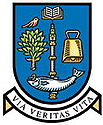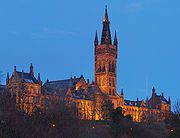- Glasgow University
-
Universität Glasgow Motto Via, Veritas, Vita Gründung 1451 Trägerschaft staatlich Ort Glasgow, Vereinigtes Königreich Leitung Kenneth Calman (Kanzler)
Charles Kennedy (Rektor)Studenten 23.590 (2006) Mitarbeiter 5.807 (2006) Website http://www.gla.ac.uk Die Universität Glasgow (englisch University of Glasgow; lat.:Universitatis Glasguensis) ist die größte der drei Universitäten in Glasgow und damit zugleich die größte Schottlands. Die Universität Glasgow gehört zur Russell-Gruppe der großen britischen, in der Forschung führenden Universitäten.
Inhaltsverzeichnis
Allgemeines
Sie wurde 1451, auf Vorschlag von König Jakob II hin, durch Papst Nikolaus V. gegründet. Sie ist damit die zweitälteste Universität Schottlands (und viertälteste Großbritanniens) nach der renommierten Universität St Andrews, die nur rund 40 Jahre älter ist. Papst Nikolaus V. erteilte damals dem Glasgower Bischof William Turnbull die Genehmigung, eine Universität an seiner Kathedrale einzurichten.
Berühmte Absolventen der University of Glasgow sind unter anderem James Watt (Mathematiker und Ingenieur), William Thomson (Physiker; besser bekannt als Lord Kelvin), Adam Smith (Ökonom und Philosoph) und John Knox (Reformatorischer Theologe und Reformator Schottlands). Des Weiteren haben folgende sechs Nobelpreisträger an der University of Glasgow studiert, gelehrt oder geforscht:
- Sir William Ramsay
- Frederick Soddy
- John Boyd Orr
- Sir Alexander Robert Todd
- Sir Derek H. R. Barton
- Sir James Whyte Black
Im Februar 2006 hatte die Universität ca. 19.500 Studenten und 5.500 Beschäftigte. Mehr als 4.000 der Studenten sind postgraduate students und ca. 2.700 sind Studenten von außerhalb Großbritanniens (5 % aus Europa und 9 % außerhalb Europas).
Verwaltung
Rektor
Der Rektor (engl. offizieller Titel „Lord Rector“, meist verkürzt zu „Rector“) der Universität Glasgow wird alle drei Jahre von den Studenten gewählt. Die Position wurde durch den schottischen „Universities Act“ von 1889 für die damals bestehenden schottischen Universitäten festgeschrieben. Aufgabe des Rektors ist es, die Belange der Studenten zu vertreten.
- 1690–1691: David Boyle, 1. Earl of Glasgow
- 1691–1718: Sir John Maxwell of Nether Park
- 1718–1720: Mungo Graham of Gorthie
- 1720–1723: Robert Dundas, Lord Arniston, the elder
- 1723–1725: James Hamilton of Aikenhead
- 1725–1726: Sir Hugh Montgomerie of Hartfield
- 1726–1729: George Ross, Master of Ross
- 1729–1731: Francis Dunlop of Dunlop
- 1731–1733: John Orr of Barrowfield
- 1733–1738: Colin Campbell of Blythswood
- 1738–1740: George Bogle of Daldowie
- 1740–1742: John Graham of Dugalston
- 1742–1743: John Orr of Barrowfield
- 1743–1746: George Bogle of Daldowie
- 1746–1748: Sir John Maxwell of Pollock
- 1748–1750: George Bogle of Daldowie
- 1750–1753: Sir John Maxwell of Pollock
- 1753–1755: William Mure of Caldwell
- 1755–1757: John Boyle, 3. Earl of Glasgow
- 1757–1759: Patrick Boyle, Lord Shewalton
- 1759–1761: James Milliken of Milliken
- 1761–1763: James Hay, 15. Earl of Erroll
- 1763–1764: Sir Thomas Miller of Barskimmen
- 1764–1767: William Mure of Caldwell
- 1767–1768: Dunbar Douglas, 4. Earl of Selkirk
- 1768–1770: Sir Adam Ferguson of Kilkerran
- 1770–1772: Robert Ord
- 1772–1773: Sir Frederick Campbell
- 1773–1775: Charles Schaw Cathcart, 9. Lord Cathcart
- 1775–1777: Sir James William Montgomery
- 1777–1779: Andrew Stewart of Torrance
- 1779–1781: James Maitland, 7. Earl of Lauderdale
- 1781–1783: Henry Dundas, 1. Viscount Melville
- 1783–1785: Edmund Burke
- 1785–1787: Robert Graham of Gartmore
- 1787–1789: Adam Smith
- 1789–1791: Walter Campbell of Shawfield
- 1791–1793: Thomas Kennedy of Dunure
- 1793–1795: William Mure of Caldwell
- 1795–1797: William McDowell of Garthland
- 1797–1799: George Oswald of Auchencruive
- 1799–1801: Sir Ilay Campbell of Succoth
- 1801–1803: William Craig, Lord Craig
- 1803–1805: Robert Dundas of Arniston
- 1805–1807: Henry Glassford of Dugalston
- 1807–1809: Archibald Colquhoun of Killermont
- 1809–1811: Archibald Campbell of Blythswood
- 1811–1813: Lord Archibald Hamilton
- 1813–1815: Thomas Graham, Lord Lynedoch
- 1815–1817: David Boyle, Lord Boyle
- 1817–1819: George Boyle, 4. Earl of Glasgow
- 1819–1820: Kirkman Finlay
- 1820–1822: Francis Jeffrey
- 1822–1824: Sir James Mackintosh
- 1824–1826: Henry Brougham, 1. Baron Brougham and Vaux
- 1826–1829: Thomas Campbell
- 1829–1831: Henry Petty-FitzMaurice, 3. Marquess of Lansdowne
- 1831–1834: Henry Thomas Cockburn
- 1834–1836: Edward Smith-Stanley, 14. Earl of Derby
- 1836–1838: Sir Robert Peel
- 1838–1840: Sir James Graham, 2. Baronet
- 1840–1842: John Campbell, 2. Marquess of Breadalbane
- 1842–1844: Fox Maule Ramsay, 11. Earl of Dalhousie
- 1844–1846: Andrew Rutherford
- 1846–1847: John Russell, 1. Earl Russell
- 1847–1848: William Mure of Caldwell
- 1848–1850: Thomas Babington Macaulay
- 1850–1852: Sir Archibald Alison
- 1852–1854: Archibald Montgomerie, 13. Earl of Eglinton
- 1854–1856: George Douglas Campbell, 8. Duke of Argyll
- 1856–1859: Edward Bulwer-Lytton, 1. Baron Lytton
- 1859–1862: James Bruce, 8. Earl of Elgin
- 1862–1865: Henry John Temple, 3. Viscount Palmerston
- 1865–1868: John Inglis, Lord Glencorse
- 1868–1871: Edward Stanley, 15. Earl of Derby
- 1871–1877: Benjamin Disraeli
- 1877–1880: William Ewart Gladstone
- 1880–1883: John Bright
- 1883–1884: Henry Fawcett
- 1884–1887: Prof. Edmund Law Lushington
- 1887–1890: Robert Bulwer-Lytton, 1. Earl of Lytton
- 1890–1893: Arthur James Balfour, 1. Earl Balfour
- 1893–1896: Sir John Eldon Gorst
- 1896–1899: Joseph Chamberlain
- 1899–1902: Archibald Primrose, 5. Earl of Rosebery
- 1902–1905: George Wyndham
- 1905–1908: Herbert Asquith, 1. Earl of Oxford & Asquith
- 1908–1911: George Nathaniel, 1. Baron Curzon
- 1911–1914: Augustine Birrell
- 1914–1919: Raymond Poincaré
- 1919–1922: Andrew Bonar Law
- 1922–1925: Frederick Edwin Smith, 1. Earl of Birkenhead
- 1925–1928: Sir Austen Chamberlain
- 1928–1931: Stanley Baldwin, 1. Earl Baldwin
- 1931–1934: Compton Mackenzie
- 1934–1937: Sir Iain Colquhoun, Bt. of Luss
- 1937–1938: Rev Dick Sheppard
- 1938–1945: Sir Archibald Sinclair, Bt. of Ulbster
- 1945–1947: Sir John Boyd-Orr
- 1947–1950: Walter Elliot
- 1950–1953: John MacCormick
- 1953–1956: Dr Tom Honeyman
- 1956–1959: Rab Butler
- 1959–1962: Quintin McGarel Hogg, Lord Hailsham
- 1962–1965: Chief Albert Luthuli
- 1965–1968: John Reith, 1. Baron Reith
- 1968–1971: Rev. George MacLeod
- 1971–1974: Jimmy Reid
- 1974–1977: Arthur Montford
- 1977–1980: John L. Bell
- 1980–1984: Reginald Bosanquet
- 1984–1987: Michael Kelly
- 1987–1990: Winnie Mandela
- 1990–1993: Pat Kane
- 1993–1996: Johnny Ball
- 1996–1999: Richard Wilson
- 1999–2000: Ross Kemp
- 2001–2004: Greg Hemphill
- 2004-2008: Mordechai Vanunu
- Seit 2008 Charles Kennedy
Kanzler und Vizekanzler
Die Kanzler der Universität in chronologischer Reihenfolge sind:
- William Turnbull (1451)
- Andrew de Durisdere (1455)
- John Laing (1474)
- Robert Blackadder (1483)
- James Beaton (1508)
- Gavin Dunbar (1524)
- James Beaton II. (1551–1560)
- John Porterfield (1571)
- James Boyd (1572)
- Robert Montgomery (1581)
- William Erskine (1585)
- Walter Stewart, 1. Lord Blantyre (1587)
- John Spottiswoode (1603)
- James Law (1615)
- Patrick Lindsay (1633)
- James Hamilton, 3. Marquess of Hamilton (1642)
- John Thurloe (1658)
- William Cunningham, 8. Earl of Glencairn (1660)
- Andrew Fairfowl (1661)
- Alexander Burnet (1664)
- Robert Leighton (1672)
- Alexander Burnet (1674)
- Arthur Ross (1679)
- Alexander Cairncross (1684)
- John Paterson (1687)
- John Carmichael, 2. Lord Carmichael (1692)
- James Graham, 1. Duke of Montrose (1714)
- William Graham, 2. Duke of Montrose (1743)
- James Graham, 3. Duke of Montrose (1781)
- James Graham, 4. Duke of Montrose (1837)
- Sir William Stirling-Maxwell of Pollock (1875)
- Walter Montagu-Douglas-Scott, 5. Duke of Buccleuch, 7. Duke of Queensberry (1878)
- John Hamilton Dalrymple, 10. Earl of Stair (1884)
- William Thomson, 1. Baron Kelvin (1904)
- Archibald Primrose, 5. Earl of Rosebery (1908)
- Sir Donald MacAlister, 1. Baronet (1929)
- Sir Daniel Macaulay Stevenson (1934–1944)
- Sir John Boyd Orr, 1. Baron Boyd-Orr (1946)
- Sir Alexander Kirkland Cairncross(1972)
- Sir William Kerr Fraser (1996)
- Professor Sir Kenneth Calman (2006)
Die Vizekanzler (engl. „Principal“ oder „Vice-Chancellor“) sind:
- Archibald Davidson (1785)
- William Taylor (Politiker) (1803)
- Duncan MacFarlan (1823)
- Thomas Barclay (1858)
- John Caird (1873)
- Robert Story (1898)
- Sir Donald MacAlister, 1. Baronet (1909)
- Sir Robert Sangster Rait (1929)
- Sir Hector Hetherington (1936)
- Sir Charles Haynes Wilson (1961)
- Sir Alwyn Williams (1972)
- Sir William Kerr Fraser (1988)
- Sir Graeme Davies (1995)
- Sir Muir Russell (2003)
Weblinks
- Website der Universität Glasgow
- Glasgow University Students' Representative Council
- Glasgow University Union
- Queen Margaret Union
- Hetherington Research Club
- Glasgow University Sports Association (GUSA)
- Glasgow University Magazine (GUM)
England: Anglia Ruskin | University of the Arts (Camberwell, Central Saint Martins, Chelsea, LC Communication, LC Fashion, Wimbledon) | Aston | Bath | Bath Spa | Bedfordshire | Birmingham | Birmingham City | Birmingham Conservatoire | Bolton | Bournemouth | Bradford | Brighton | Bristol | Brunel | Buckingham | Buckinghamshire New | Cambridge | Canterbury Christ Church | Central Lancashire | Chester | Chichester | City | Coventry | Cranfield | Creative Arts | Cumbria | De Montfort | Derby | Durham | East Anglia | East London | Edge Hill | Essex | Exeter | Gloucestershire | Greenwich | Hertfordshire | Huddersfield | Hull | Imperial | Kent | Keele | Kingston | Lancaster | Leeds | Leeds Metropolitan | Leicester | Lincoln | Liverpool | Liverpool Hope | Liverpool John Moores | London (Birkbeck, Central School of Speech and Drama, Courtauld Institute of Art, Goldsmiths, Heythrop, Institute of Cancer Research, Institute of Education, King's, London Business School, LSE, LSHTM, Queen Mary, Royal Academy of Music, Royal Holloway, Royal Veterinary College, St George’s, SOAS, School of Pharmacy, UCL) | London Metropolitan | London South Bank | Loughborough | Manchester | Manchester Metropolitan | Middlesex | Newcastle | Northampton | Northumbria | Nottingham | Nottingham Trent | Oxford | Oxford Brookes | Plymouth | Portsmouth | Reading | Roehampton | Royal College of Art | Salford | Sheffield | Sheffield Hallam | Southampton | Southampton Solent | Staffordshire | Sunderland | Surrey | Sussex | Teesside | Thames Valley | Warwick | UWE | Westminster | Winchester | Wolverhampton | Worcester | York | York St John
Schottland: Aberdeen | Abertay | Dundee | Edinburgh | Edinburgh Napier | Glasgow | Glasgow Caledonian | Heriot-Watt | Queen Margaret | Robert Gordon | St Andrews | Stirling | Strathclyde | West of Scotland
Wales: University of Wales (Bangor, Glyndŵr, Lampeter, Newport, Swansea, Swansea Metropolitan, Trinity, UWIC) | Aberystwyth | Cardiff | Glamorgan
Nordirland: Queen's | Ulster
University Colleges: Birmingham | Bishop Grosseteste | Falmouth | Harper Adams | Irish Baptist College | Marjon | Newman | Norwich | St. Mary's (Belfast) | St. Mary's (Twickenham) | Stranmillis
Wikimedia Foundation.


